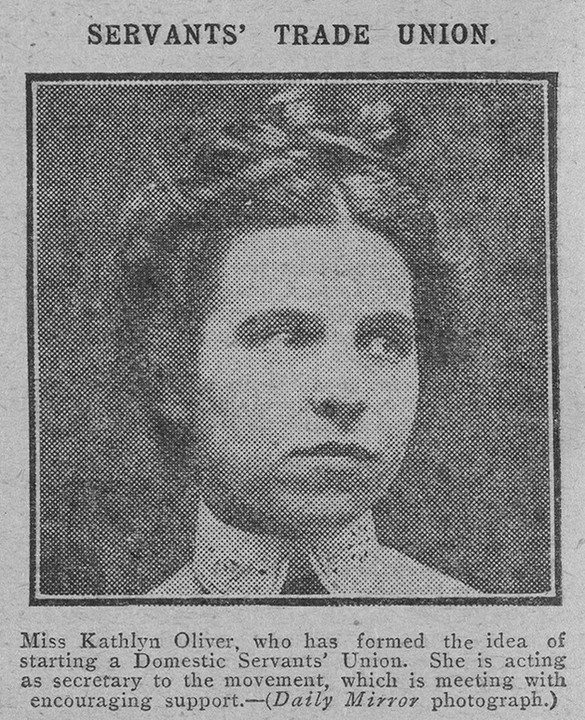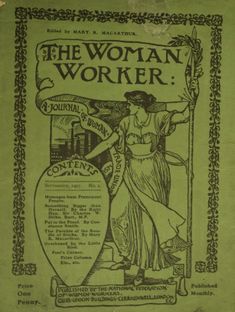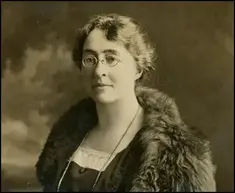Kathlyn Oliver
1884 - 1953Kathlyn Oliver was a domestic servant who formed the Domestic Workers’ Union of Great Britain in 1910 at a time when domestic servants had no employment rights or advocacy for better pay and working conditions within the labour and trade union movement. The Domestic Workers Union was the first of its kind and had its head office in Belsize Road, Camden. Kathlyn was a feminist, pacifist and campaigner for animal welfare. She identified as ‘intermediate sex’; the title of a book by Edward Carpenter which expressed his support of ‘homosexual love’. Today, she may have identified as Lesbian.

Kathlyn Oliver was a domestic servant who formed the Domestic Workers’ Union of Great Britain in 1910 at a time when domestic servants had no employment rights or advocacy for better pay and working conditions within the labour and trade union movement. The Domestic Workers Union was the first of its kind and had its head office in Belsize Road, Camden. Kathlyn was a feminist, pacifist and campaigner for animal welfare. She identified as ‘intermediate sex’; the title of a book by Edward Carpenter which expressed his support of ‘homosexual love’. Today, she may have identified as Lesbian.


About Kathlyn Oliver
Kathlyn Oliver was born on 31 March 1884 to a middle-class family but was not highly educated. When her father died she was forced to seek employment to support herself. Like many women in this position at the time, domestic service was the only option to earn a living. Kathlyn worked as a domestic worker in numerous households and came to recognise the ill treatment received by many workers. There were millions of domestic workers in this period and many were women working in the worst of employment conditions. The nature of their employment (living within family households) meant there were no clear contractual obligations by employers, and they could be subject to harsh restrictions and ill treatment without any redress.
Kathlyn, having moved jobs multiple times, found employment with Mary Sheepshanks, the principal of Morley College for Working Men and Women which provided adult learning classes for working people. Mary Sheepshanks was a feminist, suffragist and socialist and supported Kathlyn’s political interests. Mary enabled Kathlyn to attend lectures at Morley College. Kathlyn also started to correspond with The Woman Worker, the official journal of the National Federation of Women Workers on subjects relating to domestic workers.
“Kathlyn Oliver was a fluent, bold, and witty writer, and her prose style was well suited to her unflinching radicalism and clear-sighted political analysis. She contributed to a number of feminist debates, especially on sexuality and the right to love other women.”
Laura Shwartz, Oxford Dictionary of National Biography, 2020.
Domestic Workers’ Union of Great Britain
In October 1909 Kathlyn held a meeting to form a committee to set up the first domestic workers’ union. In 1910 she formed the Domestic Workers’ Union of Great Britain and was its inaugural general secretary. The union was part of the National Federation of Women Workers and had its office at 211 Belsize Road, Camden. She welcomed many domestic workers as members from the surrounding neighbourhoods in Camden, as well as across the country. Kathlyn highlighted the clear class issues between middle class women political activists and their equality goals and the reality of working class women’s employment. Despite being united in the ideas of the suffrage movement, many middle class women were nervous of their domestic workers becoming organised and unionised. Kathlyn understood this and was insistent any union she formed was run by domestic workers for domestic workers. Kathlyn worked hard to set up the union, and then handed the general secretary post to Grace Neal, a domestic cook. The union campaigned for formal employment contracts and better working conditions and exposed exploitation of domestic workers. It operated until the First World War when many of its members left domestic service to enter war work in factories.
“She was quick to point out the hypocrisy of middle-class women who claimed to be working for the emancipation of their sex while exploiting their female servants. She insisted that the Domestic Workers' Union was there to represent the interests of the workers, rather than depend upon the goodwill of a handful of enlightened mistresses, and she did not attempt to deny accusations of advocating ‘class war' between women.”
Laura Shwartz, Oxford Dictionary of National Biography, 2020.
Kathlyn and the Suffrage movement
Kathlyn Oliver supported the suffrage movement and was an advocate for women domestic workers in the campaign for the emancipation of women in the UK. Her feminist principles led her to become a voice for working women. She became a member of the People’s Suffrage Federation, a group who believed that the suffrage movement was being undermined by class divisions. They published Kathlyn’s pamphlet called Domestic Servants and Citizenship in 1911 in which she proposed domestic workers should no longer live at their place of employment and that they should be employed by the government. In the pamphlet she also pointed out that when domestic workers are allowed to vote their working conditions would improve.
Kathlyn continued to write and correspond with various journals including The Clarion (socialist paper), The Woman Worker, The Common Cause (National Union of Women’s Suffrage Societies’ newspaper) and The Freewoman (independent journal run by women) in support of women’s suffrage and the rights of domestic workers.
Kathlyn on love
Kathlyn Oliver identified as ‘intermediate sex’. This was the 1908 title of a book by Edward Carpenter which expressed his support of ‘homosexual love’. At the time, same gender sex between men was illegal, but not for same gender sex between women. It was, however, considered ‘indecent’ by many people and Lesbians were subjected to prejudice. Kathlyn wrote to Carpenter about his ideas and in correspondence in 1915 she wrote that, aged 29, she first felt sexual desire when she fell in love with a woman. Sadly, this love was rejected. She wrote to Carpenter, "I should love above all things to be able to live with her and be as intimate as it is possible to be, and I don't feel that this desire is at all immoral or degrading."
Kathlyn was open about her feelings for women and submitted personal ads to meet like-minded women in newspapers such as The Morning Herald (in 1915) and The West London Observer (in 1932). Sadly, Kathlyn did not have the long-term relationship she wished for and wrote to Carpenter of her loneliness and isolation.
“I have been more in love with women than I have with any of the opposite sex…”
Kathlyn Oliver, The Woman Worker, 11th August 1909.
to learn more about Kathlyn Oliver
Supporters
